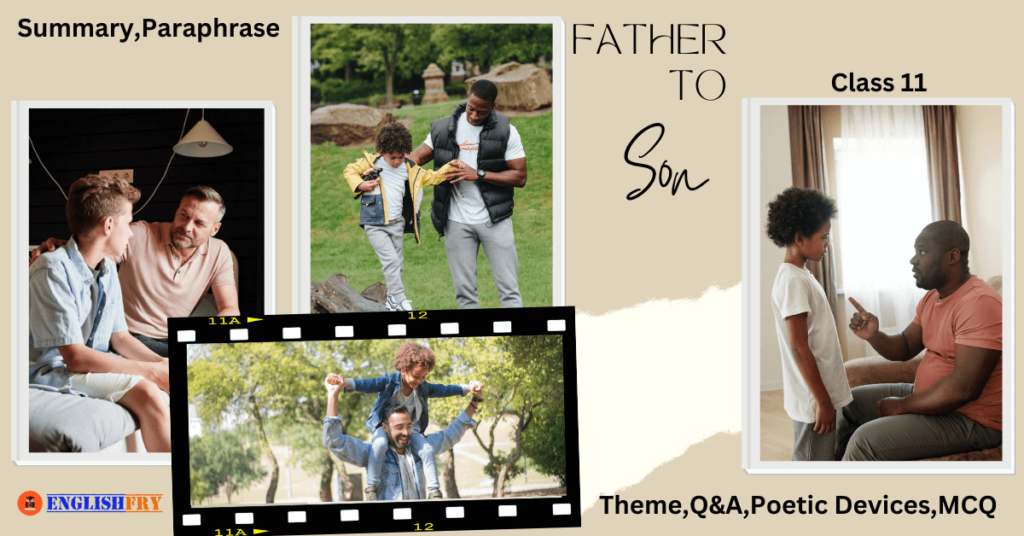Table of Contents
ToggleINTRODUCTION
The poem brings out the agony of a father who has lost all kinship with his son. The son is now grown-up. He lives in his own world. He has no feeling of any relationship with his father. The father bitterly feels the pangs of this emotional separation. He wants the same kind of bond with his son as he had when the son was a little child. Instead of coming together they are drifting apart. There is a gap of understanding and communication. Such a situation is a common feature in most of the families. The new generation wants to live life on its own terms. The youngsters think independently. They cease to be on talking terms. Father feels helpless. He is ready to forgive the child provided the latter fees sorry. But he rarely tries to understand the young boy’s likes and dislikes, demands and dreams. The conflict is never resolved because they refuse to compromise.
THEME
The theme of the poem is the generation gap which occurs when the communication link between two generations breaks due to a mutual lack of understanding, tolerance and acceptance. The poem highlights the internal conflict a father undergoes when his son becomes old enough to define his own interests, thoughts and perceptions. The brooding father complains that he cannot understand his child despite having lived together for many years in the same house. The father tries to continue a relationship based on what he knew of the son from his youngest years but of course, the son has change over time. The tone is almost pleading, attempting to find a link with his grownup son.
Original Poem
Father to Son :
I do not understand this child
Though we have lived together now
In the same house for years. I know
Nothing of him, so try to build
Up a relationship from how
He was when small. Yet have I killed
The seed I spent or sown it where
The land is his and none of mine?
We speak like strangers, there’s no sign
Of understanding in the air.
This child is built to my design
Yet what he loves I cannot share.
Silence surrounds us. I would have
Him prodigal, returning to
His father’s house, the home he knew,
Rather than see him make and move
His world. I would forgive him too,
Shaping from sorrow a new love.
Father and son, we both must live
On the same globe and the same land.
He speaks: I cannot understand
Myself, why anger grows from grief.
We each put out an empty hand,
Longing for something to forgive.
A Poem by ELIZABETH JENNINGS
Word-Meanings
Here are word meanings suggested from the poem :
Prodigal: A word meaning wastefully extravagant, often used to describe someone who spends recklessly or returns after a period of absence, as in the parable of the prodigal son from the Bible.
Understanding: In the context of the poem, it refers to comprehension or mutual knowledge between the speaker and the child.
Sown: The act of planting seeds in the ground for them to grow.
Sign: An indication or gesture that conveys a message or meaning.
Silence: The absence of sound, often representing a lack of communication or understanding between the speaker and the child in the poem.
Sorrow: A feeling of deep distress or sadness, typically caused by a loss or disappointment.
Globe: In this context, it refers to the Earth, representing the shared world in which both the father and the child live.
Grief: Intense sorrow or sadness, often related to a loss or emotional distress.
Forgive: To grant pardon or release from blame, typically used in the context of letting go of negative feelings or anger.
Relationship: The way in which two or more people or things are connected or interconnected, often emotionally or socially.
Strangers: People who do not know each other or have a close relationship, reflecting the distant and unfamiliar nature of the relationship between the father and the child in the poem.
Seed: In the poem, it can represent both the biological offspring and the potential for a relationship to grow and develop.
Design: Referring to the way in which the child was raised or shaped by the father, indicating the father’s influence on the child’s upbringing.
Home: The place where one lives and feels a sense of belonging, which the father hopes the child will return to in the poem.
Anger: A strong feeling of displeasure or hostility, often arising from frustration or disagreement.
New love: Suggests the possibility of a renewed or transformed love, indicating the desire for a deeper connection or understanding.
Empty hand: Symbolizes a lack of fulfillment or satisfaction, reflecting the longing for something to forgive or reconcile in their relationship.
These word meanings help to clarify the themes and emotions expressed in the poem.
SUMMARY
The father complains that he does not understand his own child. Though they have lived together for so many years under the same roof. The father tries to build up a relationship with his son from the early years, in a manner when his son began to recognize people around, to crawl and to walk in a desperate attempt.
The father wonders whether he has destroyed the seed of his off-spring or sown it where the land belongs to his heir and none is his. Both father and son continue to speak like strangers now and there seem no signs of understanding in the air between the two.
In traditional belief, the son is created and born to the likings and designs of his father, yet in this case, the father cannot share what his son loves. Most of the time silence surrounds them. The father’s greatest wish is for his son to be ‘The Prodigal’ son who will very soon return to his father’s house; the home which he always knew.
This is definitely the better alternative rather than to see his son move out into the world blindly on his own, by himself and fall into trouble. The father is ready to forgive him at any cost as long as he is able to reshape him up from the longbounded sorrow to a new love.
Both father and son all over the world must learn to live on the same globe and on the same land. Both father and son want to forgive each other, but neither is ready to take the first step of asking for forgiveness from the other. However, the situation can improve if they find a way of getting closer to each other.
DETAILED EXPLANATION
I do not understand this child
Though we have lived together now In the same house for years.
I know Nothing of him, so try to build
Up a relationship from how He was when small.
The father unhappily reflects on his inability to understand his own son. They have been staying in the same house for years but, due to non- communication and a lack of understanding, both son and father are not able to understand each other. The father does not know much about his son’s interests, likes or dislikes. Thus, he tries to build up the same kind of relationship as he used to have when his son was a little child. The father has now perhaps realized that there is a lack of understanding between his son and himself and he wants to take measures so that their relationship improves.
Yet I have killed. The seed I spent or sown it where The land is his and none of mine?
We speak like strangers, there’s no sign Of understanding in the air.
This child is built to my design Yet what he loves I cannot share.
The father wonders whether he has destroyed the seed of his off-spring or sown it where the land belongs to his heir and none is his. The father feels that though the child is his son but perhaps he lives in a world different from him. Both father and son behave like strangers. There is lack of understanding and a communication gap which makes them behave not like father and son but more like strangers. The father says that physically the child resembles him but he does not appreciate what his son likes.
Silence surrounds us. I would have
Him prodigal, returning to
His father’s house, the home he knew,
Rather than see him make and move
His world. I would forgive him too,
Shaping from sorrow a new love.
Silence surrounds their relationship because there is a complete lack of communication between them. The father’s greatest wish is for his son to be ‘The Prodigal’ son who will very soon return to his father’s house; the home which he always knew. This is definitely the better alternative rather than to see his son move out into the world blindly on his own, by himself and fall into trouble. He does not want the son to start life afresh without the father. The father is ready to forgive him at any cost as long as he is able to reshape him up from the long-bounded sorrow to a new love.
Father and son, we both must live
On the same globe and the same land.
He speaks: I cannot understand
Myself, why anger grows from grief.
We each put out an empty hand,
Longing for something to forgive.
Both fathers and their sons all over the world must learn to live together in spite of their misunderstandings and differences. At this point in the poem, the son speaks for the first time and admits that he too feels the sadness of the broken relationship, but he is angry due to his confusion. Both father and son want to forgive each other, but neither is ready to take the first step of asking for forgiveness from the other. However, the situation can improve if they find a way of getting closer to each other.
POETIC DEVICES
- SIMILE- A simile is a figure of speech that compares two different things in an interesting Eg. We speak like strangers
- ALLITERATION-the occurrence of the same letter or sound at the beginning of adjacent or closely connected words. e.g. Silence surrounds us, the home he knew
- ALLUSION- Allusion means an indirect reference. It is a figure of speech in which a reference, typically brief, to a person, place, thing, event, or other literary work with which the reader is presumably familiar. It does not describe in detail the person or thing it refers to. Eg, reference to “prodigal” son story from the Bible.
- ANTITHESIS: In this figure of speech two contrasting or opposing ideas are put For example,
- The land is his and none of mine
- Shaping from sorrow a new love
Father to son Question And Answer
1.Why is the father unhappy with his son?
The father is unhappy with the son because the son is unlike his father in most aspects and has his own thoughts and interests in spite of having been brought up in the environment and with the values that the father provided him with.
2.What is the irony in the poem father to son?
The poet has highlighted a sharp and contrasting relationship in the poem between father and a son. The irony which a poet talk about in the poem is that they have lived for many years together yet he knows nothing much about son.
3.Why does the father feel he and his son are like strangers to each other?
The father feels that he and his son are like strangers to each other because there is no interaction between the father and the son. As there is no love, warmth or understanding between them, they even do not share any common interest. They have a communication gap though they have been living under the same roof for years.
4.What kind of relationship do the father and the son share? Why is it so?
The relationship between the father and the son is estranged. They live like strangers though they live under one roof. Their interests are totally different. The father does not share what his son loves. There is no understanding between the two because there is lack of communication.
5.Why is the father unable to understand his son in ‘Father to Son’?
The father is unable to understand his son in the poem ‘Father to Son’ due to miscommunication and generation gap. Though he and his son lived together in the same house but they did not share any love or interests, therefore, he does not understand him.
6.What is the father’s complaint against his son?
The father complains that he is losing touch with his own son. Their relationship is under strain. They live like strangers in the same house. The son wants to live life on his own terms and free himself from parental domination.
7.What does the poet mean by `silence surrounds us?
The father is troubled because there is no interaction between them. Though they have been living under the same roof for years but they do not understand each other and live like strangers. Their outlook and temperament are different. They have a communication gap along with the generation gap. So, both are unhappy and want to come closer but they can’t help it.
8.Father and the son behave like strangers to each other. What can be the possible reason with for this?
They both act and behave like strangers due to lack of understanding with each other. A growing son has his own ambitions and aspirations. Elders must try to act like friends rather than command their children to behave according to their orders.
9.What do the words ‘an empty hand’ signify?
The words ‘empty hand’ signify that both the father and the son want to forgive each other and extend a hand of friendship to each other, but neither of them is willing to be the first one to do so. This means that although they are longing to forgive each other, their egos are coming in the way so that none of them wants to be the first one to do so.
10.Is the father responsible for the present situation? What are your views?
Yes. I think the father is responsible for the present situation. We do not get to hear the son’s version about his relationship with the father here. But the father is guilty of allowing continued silence or non-communication between them and also not understanding the son’s aspirations and feelings.
11.What sort of father-son relationship has been depicted in the poem ‘Father to Son?
The poem begins on an autobiographical note. The speaker i.e., the father recounts his own experience.The poem depicts a father-son relationship which exists in name only. The two have been living together in the same house for years. Even then the father does not understand his son. He confesses that he knows nothing of his son. The bond of affection between them lie broken. Theyhave become formal just like strangers. Although the son resembles his father physically, yet he had his own vision, dreams and aspiration. He is not home bound and is not afraid to venture forth. The protective father is willing to forgive him for incurring loss of material wealth provided he returns home. The painful experience of lack of communication fills the father with utter helplessness, anger and grief. His efforts to restore the relationship fail as there is no response from the other side. This maladjustment or growing break-up of relationships is typical of the modem materialistic age.
12.Why is the father unhappy with his son?
The father is unhappy with the son because the son is unlike his father in most aspects and has his own thoughts and interests in spite of having been brought up in the environment and with the values that the father provided him with.
13.What is the irony in the poem father to son?
The poet has highlighted a sharp and contrasting relationship in the poem between father and a son. The irony which a poet talk about in the poem is that they have lived for many years together yet he knows nothing much about son.
14.Why does the father feel he and his son are like strangers to each other?
The father feels that he and his son are like strangers to each other because there is no interaction between the father and the son. As there is no love, warmth or understanding between them, they even do not share any common interest. They have a communication gap though they have been living under the same roof for years.
14.What kind of relationship do the father and the son share? Why is it so?
The relationship between the father and the son is estranged. They live like strangers though they live under one roof. Their interests are totally different. The father does not share what his son loves. There is no understanding between the two because there is lack of communication.
15.Why is the father unable to understand his son in ‘Father to Son’?
The father is unable to understand his son in the poem ‘Father to Son’ due to miscommunication and generation gap. Though he and his son lived together in the same house but they did not share any love or interests, therefore, he does not understand him.
16.What is the father’s complaint against his son?
The father complains that he is losing touch with his own son. Their relationship is under strain. They live like strangers in the same house. The son wants to live life on his own terms and free himself from parental domination.
17.What does the poet mean by `silence surrounds us?
The father is troubled because there is no interaction between them. Though they have been living under the same roof for years but they do not understand each other and live like strangers. Their outlook and temperament are different. They have a communication gap along with the generation gap. So, both are unhappy and want to come closer but they can’t help it.
18.Father and the son behave like strangers to each other. What can be the possible reason
with for this?
They both act and behave like strangers due to lack of understanding with each other. A growing son has his own ambitions and aspirations. Elders must try to act like friends rather than command their children to behave according to their orders.
19.What do the words ‘an empty hand’ signify?
The words ‘empty hand’ signify that both the father and the son want to forgive each other and extend a hand of friendship to each other, but neither of them is willing to be the first one to do so. This means that although they are longing to forgive each other, their egos are coming in the way so that none of them wants to be the first one to do so.
20.Is the father responsible for the present situation? What are your views?
Yes. I think the father is responsible for the present situation. We do not get to hear the son’s version about his relationship with the father here. But the father is guilty of allowing continued silence or non-communication between them .
21.What sort of father-son relationship has been depicted in the poem ‘Father to Son?
The poem begins on an autobiographical note. The speaker i.e., the father recounts his own experience.The poem depicts a father-son relationship which exists in name only. The two have been living together in the same house for years. Even then the father does not understand his son. He confesses that he knows nothing of his son. The bond of affection between them lie broken. They have become formal just like strangers. Although the son resembles his father physically, yet he had his own vision, dreams and aspiration. He is not home bound and is not afraid to venture forth. The protective father is willing to forgive him for incurring loss of material wealth provided he returns home. The painful experience of lack of communication fills the father with utter helplessness, anger and grief. His efforts to restore the relationship fail as there is no response from the other side. This maladjustment or growing break-up of relationships is typical of the modem materialistic age.
Founder of Englishfry.com, a captivating and knowledge-driven blog & Founder of Android app/website Studyfunnel.com, an online Mock Test Series Portal. With a wealth of experience spanning over 16+ years, he has excelled as an Ex-professor, Teacher, Author of Book “Island of Illusion”, Website Developer, Graphic Designer,Blogger,Poet, and Creative academic content writer. His tryst in Literature helped him realize his love for writing and telling stories. A tech-savvy language nerd by day and, a passionate writer by night, he now translates his experiences into tales of wisdom served with a side of humor.His widely recognized profound insights ,captivating writing style makes him contribute to prestigious publications and a sought-after authority in the field.








